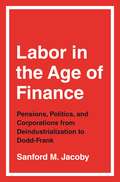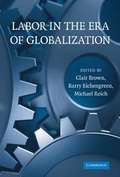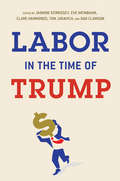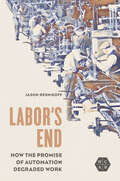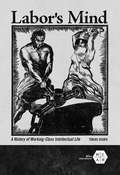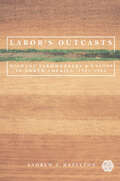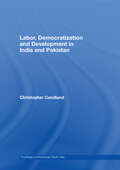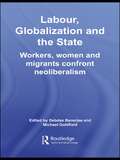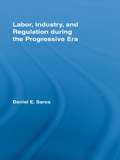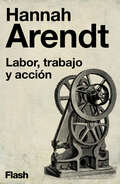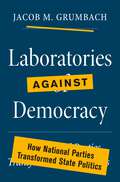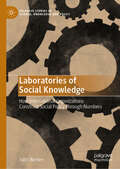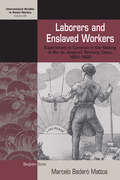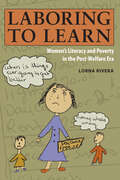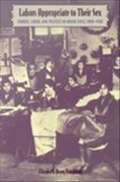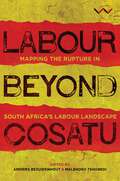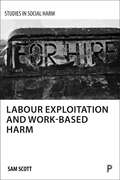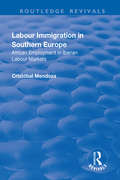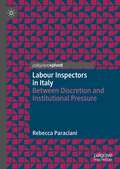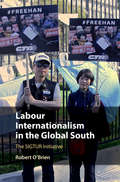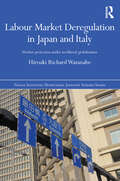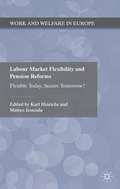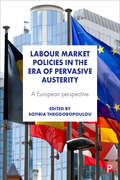- Table View
- List View
Labor in the Age of Finance: Pensions, Politics, and Corporations from Deindustrialization to Dodd-Frank
by Sanford M. JacobyFrom award-winning economic historian Sanford M. Jacoby, a fascinating and important study of the labor movement and shareholder capitalismSince the 1970s, American unions have shrunk dramatically, as has their economic clout. Labor in the Age of Finance traces the search for new sources of power, showing how unions turned financialization to their advantage.Sanford Jacoby catalogs the array of allies and finance-based tactics labor deployed to stanch membership losses in the private sector. By leveraging pension capital, unions restructured corporate governance around issues like executive pay and accountability. In Congress, they drew on their political influence to press for corporate reforms in the wake of business scandals and the financial crisis. The effort restrained imperial CEOs but could not bridge the divide between workers and owners. Wages lagged behind investor returns, feeding the inequality identified by Occupy Wall Street. And labor’s slide continued.A compelling blend of history, economics, and politics, Labor in the Age of Finance explores the paradox of capital bestowing power to labor in the tumultuous era of Enron, Lehman Brothers, and Dodd-Frank.
Labor in the Era of Globalization
by Clair Brown Barry Eichengreen Michael ReichThe third quarter of the twentieth century was a golden age for labor in the advanced industrial countries, characterized by rising incomes, relatively egalitarian wage structures, and reasonable levels of job security. The subsequent quarter-century has seen less positive performance along a number of these dimensions. This period has instead been marked by rapid globalization of economic activity that has brought increased insecurity to workers. The contributors to this volume, prominent scholars from the United States, Europe, and Japan, distinguish four explanations for this historic shift. These include 1) rapid development of new technologies; 2) global competition for both business and labor; 3) deregulation of industry with more reliance on markets; and 4) increased immigration of workers, especially unskilled workers, from developing countries. In addition to analyzing the causes of these trends, the contributors also investigate important consequences, ranging from changes in collective bargaining and employment relations to family formation decisions and incarceration policy.
Labor in the Time of Trump
by Et Al. Jasmine KerrisseyLabor in the Time of Trump critically analyzes the right-wing attack on workers and unions and offers strategies to build a working–class movement.While President Trump's election in 2016 may have been a wakeup call for labor and the Left, the underlying processes behind this shift to the right have been building for at least forty years. The contributors show that only by analyzing the vulnerabilities in the right-wing strategy can the labor movement develop an effective response.Essays in the volume examine the conservative upsurge, explore key challenges the labor movement faces today, and draw lessons from recent activist successes.Donald Cohen, founder and executive director of In the Public Interest; Bill Fletcher, Jr., author of Solidarity Divided; Shannon Gleeson, Cornell University School of Industrial and Labor Relations; Sarah Jaffe, co-host of Dissent Magazine's Belabored podcast; Cedric Johnson, University of Illinois at Chicago; Jennifer Klein, Yale University; Gordon Lafer, University of Oregon's Labor Education and Research Center; Jose La Luz, labor activist and public intellectual; Nancy MacLean, Duke University; MaryBe McMillan, President of the North Carolina state AFL-CIO; Jon Shelton, University of Wisconsin, Green Bay; Lara Skinner, The Worker Institute at Cornell University; Kyla Walters, Sonoma State University
Labor'S Conflict
by Tom Bramble Rick KuhnOnce widely regarded as the workers greatest hope for a better world, the ALP today would rather project itself as a responsible manager of Australian capitalism. Labor's Conflict provides an insightful account of the transformations in the Party's policies, performance and structures since its formation. Seasoned political analysts, Tom Bramble and Rick Kuhn offer an incisive appraisal of the Party's successes and failures, betrayals and electoral triumphs in terms of its competing ties with bosses and workers. The early chapters outline diverse approaches to understanding the nature of the Party and then assess the ALP's evolution in response to major social upheavals and events, from the strikes of the 1890s, through two World Wars, the Great Depression, and the post-war boom. The records of the Whitlam, Hawke, Keating, Rudd and Gillard governments are then dissected in detail. The compelling conclusion offers alternatives to the Australian Labor Party, for those interested in progressive change.
Labor's End: How the Promise of Automation Degraded Work (Working Class in American History)
by Jason ResnikoffLabor's End traces the discourse around automation from its origins in the factory to its wide-ranging implications in political and social life. As Jason Resnikoff shows, the term automation expressed the conviction that industrial progress meant the inevitable abolition of manual labor from industry. But the real substance of the term reflected industry's desire to hide an intensification of human work--and labor's loss of power and protection--behind magnificent machinery and a starry-eyed faith in technological revolution. The rhetorical power of the automation ideology revealed and perpetuated a belief that the idea of freedom was incompatible with the activity of work. From there, political actors ruled out the workplace as a site of politics while some of labor's staunchest allies dismissed sped-up tasks, expanded workloads, and incipient deindustrialization in the name of technological progress. A forceful intellectual history, Labor's End challenges entrenched assumptions about automation's transformation of the American workplace.
Labor's Mind: A History of Working-Class Intellectual Life (Working Class in American History #295)
by Tobias HigbieBusiness leaders, conservative ideologues, and even some radicals of the early twentieth century dismissed working people's intellect as stunted, twisted, or altogether missing. They compared workers toiling in America's sprawling factories to animals, children, and robots. Working people regularly defied these expectations, cultivating the knowledge of experience and embracing a vibrant subculture of self-education and reading. Labor's Mind uses diaries and personal correspondence, labor college records, and a range of print and visual media to recover this social history of the working-class mind. As Higbie shows, networks of working-class learners and their middle-class allies formed nothing less than a shadow labor movement. Dispersed across the industrial landscape, this movement helped bridge conflicts within radical and progressive politics even as it trained workers for the transformative new unionism of the 1930s. Revelatory and sympathetic, Labor's Mind reclaims a forgotten chapter in working-class intellectual life while mapping present-day possibilities for labor, higher education, and digitally enabled self-study.
Labor's Outcasts: Migrant Farmworkers and Unions in North America, 1934-1966 (Working Class in American History)
by Andrew J. HazeltonIn the mid-twentieth century, corporations consolidated control over agriculture on the backs of Mexican migrant laborers through a guestworker system called the Bracero Program. The National Agricultural Workers Union (NAWU) attempted to organize these workers but met with utter indifference from the AFL-CIO. Andrew J. Hazelton examines the NAWU's opposition to the Bracero Program against the backdrop of Mexican migration and the transformation of North American agriculture. His analysis details growers’ abuse of the program to undercut organizing efforts, the NAWU's subsequent mobilization of reformers concerned by those abuses, and grower opposition to any restrictions on worker control. Though the union's organizing efforts failed, it nonetheless created effective strategies for pressuring growers and defending workers’ rights. These strategies contributed to the abandonment of the Bracero Program in 1964 and set the stage for victories by the United Farm Workers and other movements in the years to come.
Labor, Democratization and Development in India and Pakistan (Routledge Contemporary South Asia Series)
by Christopher CandlandIn this first comparative study of organized labor in India and Pakistan, the author analyses the impact and role of organized labor in democratization and development. The study provides a unique comparative history of Indian and Pakistani labor politics. It begins in the early twentieth century, when permanent unions first formed in the South Asian Subcontinent. Additionally, it offers an analysis of changes in conditions of work andterms of service in India and Pakistan and of organized labor’s response. The conclusions shed new light on the influence of organized labor in national politics, economic policy, economic welfare and at the workplace. It is demonstrated that the protection of workers has desirable outcomes not only for those workers covered but also for democratic practice and for economic development.
Labor, Globalization and the State: Workers, Women and Migrants Confront Neoliberalism (Routledge Contemporary South Asia Series #Vol. 5)
by Debdas Banerjee Michael GoldfieldThis book explores the impact of neoliberal globalization on labour markets and the state in the developed and developing world. It focuses especially on the United States and the economies of Asia – in particular, India. Liberalized trade and investment are thought by neoliberals to be the best levers for raising labour standards, provided labour market flexibility and capital market restructuring accompany them. Labour market flexibility and capital market restructuring, at a first glance, appear to be complementary and symmetric policies. In practice, however, they might have very asymmetric consequences. This book addresses these issues, and it presents a comprehensive analysis of the key questions such as: How far is globalization a ‘real’ threat to the conventional systems of wage fixation, employment pattern, and basic rights at work in both developed, as well as underdeveloped countries? Are casualization and informalization of the workforce direct outcomes of deregulation? How do labour organizations cope with the volatility of the labour market? Are the existing labour market conditions and forms of labour organizations misfits in the globalized business world? Is it at all feasible to choose a high road that combines some degree of labour market flexibility with better labour standards? This book will be of interest to academics working on International Development, Development Economics, Political Economy, Comparative Labour Studies and Asian Studies.
Labor, Industry, and Regulation during the Progressive Era (New Political Economy)
by Daniel E. SarosThe Progressive Era was among the most volatile times for the economy and labor in American History. Daniel E. Saros explores the institutional and economic conditions of this time, revealing new insight into the regulated nature of industry and the conditions of labor. Using the steel industry as a case study, Saros demonstrates how the United States Steel Corporation enhanced the performance of the steel industry by initiating a price and wage stabilization program. In an effort to combat potential threats from the federal government, the American public, and organized labor to the market stabilization program and mechanization drive, the steel companies introduced a paternalistic welfare program, company unions, and limited hours reform. Saros also contrasts this time with free market periods, examining the impacts on rates of profit, output growth, and capital accumulation.
Labor, trabajo y acción
by Hannah ArendtFlash publica uno de los textos más representativos del pensamiento de Hannah Arendt. Un ensayo que reinterpreta los conceptos de labor, trabajo y acción en su relación con el ser humano a lo largo de la historia de la humanidad. «Es el momento de aprovechar esta oportunidad para pensar en lo que es un trabajo valioso de verdad». Enrique Zamorano, El Confidencial En este texto, recogido en La pluralidad del mundo, Hannah Arendt reflexiona sobre el significado del trabajo y su relación con el ser humano a lo largo del tiempo. La filósofa toma como base el concepto de vida activa y cómo en esta se desarrollan los tres medios (labor, trabajo y acción) con los que alcanzar el «ideal» al que los griegos aspiraban desde la era pre-filosófica: una vida contemplativa, aquella que les podría otorgar calma, paz interior y claridad de pensamiento. No obstante, Arendt da un paso más allá y trata de desmontar esa jerarquía donde prevaleció durante siglos la contemplación y la calma. ¿Y si la vida activa fuera inherente al ser humano? ¿Y si estamos predestinados a la actividad para mantenernos vivos? ¿No deberíamos resignificar nuestros valores? Con estas preguntas, Arendt examina los tres conceptos que ponen en el centro al ser humano y su relación con el entorno: la labor, como una actividad rutinaria y necesaria para la supervivencia del individuo; el trabajo, como el esfuerzo que produce un mundo con objetos sólidos y perdurables, que sobreviven a la finitud de los organismos vivos; la acción, intrínseca a los seres humanos desde que nacemos, porque estamos condenados a relacionarnos y nuestros actos tienen causas y consecuencias infinitas. A través del estudio y la separación de estas tres ideas, Arendt pone en valor la vida activa para comprender que no se puede prescindir de ella en pro de la contemplación, puesto que reivindicar la labor, el trabajo y la acción es reivindicar nuestra propia libertad como individuos en el mundo. Sobre La pluralidad del mundo: «Hoy, como entonces, el vocabulario que empleó Arendt para pensar y narrar el mundo, sus reflexiones y esa escritura tan bella, tan suya, nos ayudan a interpretar lo que nos ocurre, aunque solo sea como simples enanos mirando el mundo a hombros de gigantes. Ella, desde luego, lo fue.»Máriam Martínez-Bascuñán, Babelia, El País «Hannah Arendt volvió a pensar el espacio público después de su destrucción y nosotros debemos volver a ella para prevenir que se destruya de nuevo.»Andreu Jaume «Judía y alemana, Hannah Arendt reflexiona sobre la ascensión del nazismo y la ceguera de no haber visto a tiempo su peligro.»César Antonio Molina, ABC Sobre La libertad de ser libres: «Este ensayo recién redescubierto es como una petición de compromiso político en la era de Trump.»Die Zeit «Pese a haber sido escrito hace cincuenta años, es tan moderno que parece pensado para la actualidad política mundial.»Westdeutscher Rundfunk «Un ensayo inspirador de una relevancia extraordinaria, especialmente en tiempos en que se cuestionan los valores liberales del orden democrático.»Philosophie Sobre Eichmann en Jerusalén: «Es historia, es pensamiento y es advertencia -aún hoy- sobre las consecuencias de la banalidad del mal, de la que a pesar de lo vivido, no estamos vacunados.»Laura Barrachina, RNE «Un ensayo imprescindible. Arendt no se olvida de nadie.»Marta Michel, El Mundo - Yo Dona «En vez de defender la causa de su pueblo de manera incondicional, Arendt se puso a reflexionar, investigar y debatir. En palabras de Aristóte
Laboratories against Democracy: How National Parties Transformed State Politics (Princeton Studies in American Politics: Historical, International, and Comparative Perspectives #184)
by Jacob GrumbachAs national political fights are waged at the state level, democracy itself pays the priceOver the past generation, the Democratic and Republican parties have each become nationally coordinated political teams. American political institutions, on the other hand, remain highly decentralized. Laboratories against Democracy shows how national political conflicts are increasingly flowing through the subnational institutions of state politics—with profound consequences for public policy and American democracy.Jacob Grumbach argues that as Congress has become more gridlocked, national partisan and activist groups have shifted their sights to the state level, nationalizing state politics in the process and transforming state governments into the engines of American policymaking. He shows how this has had the ironic consequence of making policy more varied across the states as red and blue party coalitions implement increasingly distinct agendas in areas like health care, reproductive rights, and climate change. The consequences don’t stop there, however. Drawing on a wealth of new data on state policy, public opinion, money in politics, and democratic performance, Grumbach traces how national groups are using state governmental authority to suppress the vote, gerrymander districts, and erode the very foundations of democracy itself.Required reading for this precarious moment in our politics, Laboratories against Democracy reveals how the pursuit of national partisan agendas at the state level has intensified the challenges facing American democracy, and asks whether today’s state governments are mitigating the political crises of our time—or accelerating them.
Laboratories of Social Knowledge: How International Organizations Construct Social Policy Through Numbers (Palgrave Studies in Science, Knowledge and Policy)
by John BertenThe book examines the politics of knowledge in global social policy, investigating how international organisations (IOs) have contributed to the emergence and development of social security as a global policy field. It reconstructs the role of numerical knowledge in the International Labour Organization (ILO) and the World Bank, theorising how IOs contribute to epistemic infrastructures of global social security. The book shows how IOs&’ knowledge production has led to a continuous refinement of the meaning and purpose of social security. First, it reveals how IOs arrived at a shared conception of social security: what the book calls an ontological framework. Second, it traces how numbers have increasingly enabled the assessment of countries according to shared benchmarks: what the book calls an evaluative framework. The author demonstrates the political and epistemic work involved in universalising knowledge of social security, while highlighting the limits of governing by numbers in global social policy.
Laborers and Enslaved Workers: Experiences in Common in the Making of Rio de Janeiro's Working Class, 1850-1920
by Marcelo Badaró MattosFrom the middle of the nineteenth century until the 1888 abolition of slavery in Brazil, Rio de Janeiro was home to the largest urban population of enslaved workers anywhere in the Americas. It was also the site of an incipient working-class consciousness that expressed itself across seemingly distinct social categories. In this volume, Marcelo Badaró Mattos demonstrates that these two historical phenomena cannot be understood in isolation. Drawing on a wide range of historical sources, Badaró Mattos reveals the diverse labor arrangements and associative life of Rio's working class, from which emerged the many strategies that workers both free and unfree pursued in their struggles against oppression.
Laboring to Learn: Women's Literacy and Poverty in the Post-Welfare Era
by Lorna RiveraThe American adult education system has become an alternative for school dropouts, with some state welfare policies requiring teen mothers and women without high school diplomas to participate in adult education programs to receive aid. Currently, low-income women of color are more likely to be enrolled in the lowest levels of adult basic education. Very little has been published about women's experiences in these mandatory programs and whether the programs reproduce the conditions that forced women to drop out in the first place. Lorna Rivera bridges the gap with this important study, the product of ten years' active ethnographic research with formerly homeless women who participated in adult literacy education classes before and after welfare reform. She draws on rich interviews with organizers and participants in the Adult Learners Program at Project Hope, a women's shelter and community development organization in Boston's Dudley neighborhood, one of the poorest in the city. Analyzing the web of ideological contradictions regarding "work first" welfare reform policies, Rivera argues that poverty is produced and reproduced when women with low literacy skills are pushed into welfare-to-work programs and denied education. She examines how various discourses about individual choice and self-sufficiency shape the purposes of literacy, how low-income women express a sense of personal responsibility for being poor, and how neoliberal ideologies and practices compromise the goals of critical literacy programs. Throughout this study, the voices and experiences of formerly homeless women challenge cultural stereotypes about poor women, showing in personal and structural terms how social and economic forces shape and restrict opportunities for low-income women of color.
Labors Appropriate to Their Sex: Gender, Labor, and Politics in Urban Chile, 1900-1930
by Elizabeth Quay HutchisonIn Labors Appropriate to Their Sex Elizabeth Quay Hutchison addresses the plight of working women in early twentieth-century Chile, when the growth of urban manufacturing was transforming the contours of women's wage work and stimulating significant public debate, new legislation, educational reform, and social movements directed at women workers. Challenging earlier interpretations of women's economic role in Chile's industrial growth, which took at face value census figures showing a dramatic decline in women's industrial work after 1907, Hutchison shows how the spread of industrial sweatshops and changing definitions of employment in the census combined to make female labor disappear from census records at the same time that it was in fact burgeoning in urban areas. In addition to population and industrial censuses, Hutchison culls published and archival sources to illuminate such misconceptions and to reveal how women's paid labor became a locus of anxiety for a society confronting social problems--both real and imagined--that were linked to industrialization and modernization. The limited options of working women were viewed by politicians, elite women, industrialists, and labor organizers as indicative of a society in crisis, she claims, yet their struggles were also viewed as the potential springboard for reform. Labors Appropriate to Their Sex thus demonstrates how changing norms concerning gender and work were central factors in conditioning the behavior of both male and female workers, relations between capital and labor, and political change and reform in Chile. This study will be rewarding for those whose interests lie in labor, gender, or Latin American studies; as well as for those concerned with the histories of early feminism, working-class women, and sexual discrimination in Latin America.
Labour Beyond Cosatu: Mapping the rupture in South Africa’s labour landscape
by ANDRIES BEZUIDENHOUT & MALEHOKO TSHOAEDILabour Beyond Cosatu is the fourth volume in the series Taking Democracy Seriously – a ground-breaking, textured and nuanced study on workers and democracy – which was established in the 1990s. The series looks at members of trade unions affiliated to the Congress of South African Trade Unions (Cosatu) and provides a rich database of trade union members and research conducted over the past twenty years. It is one of the very few such resources available to researchers anywhere in the world. Labour Beyond Cosatu paints a complex picture. The 12 chapters of the volume explore various rebellions and conflicts in the trade union sector, starting with the National Union of Mineworkers (NUM) and rivalries between Cosatu affiliates. Unpacking the conflicts between state-sector and private-sector workers, contributors look at the impact of generational and educational shifts, seen by some commentators as proof that Cosatu is now ‘middle class’. The book also raises the issue of gender in the unions by usefully locating the controversy around charges levelled at Zwelinzima Vavi in 2013 in the larger context of serious problems in the gender politics within parts of Cosatu.Refuting the image of a union federation solidly committed to the ANC, Labour Beyond Cosatu presents evidence of a sharp decline in support for the ANC within Cosatu, and growing scepticism towards the Alliance. It shows that attempts to understand the labour movement in South Africa in the future will need to include research of smaller, independent unions and social movements. The volume’s contributors make a major contribution to key debates on labour and democracy, providing new material that can potentially shift the discussion in important ways. This book will be of great value to students and researchers in Industrial Sociology, Political Studies, Industrial Psychology and Economics and Management.
Labour Exploitation and Work-Based Harm (Studies in Social Harm)
by Sam ScottLabour exploitation is a highly topical though complex issue that has international resonance for those concerned with social justice and social welfare, but there is a lack of research available about it. This book, part of the Studies in Social Harm series, is the first to look at labour exploitation from a social harm perspective, arguing that, as a global social problem, it should be located within the broader study of work-based harm. Written by an expert in policy orientated research, he critiques existing approaches to the study of workplace exploitation, abuse and forced labour. Mapping out a new sub-discipline, this innovative book aims to shift power from employers to workers to reduce levels of labour exploitation and work-based harm. It is relevant to academics from many fields as well as legislators, policy makers, politicians, employers, union officials, activists and consumers.
Labour Immigration in Southern Europe: African Employment in Iberian Labour Markets (Routledge Revivals Ser.)
by Cristobal MendozaThis title was first published in 2003. Research on migration into southern Europe has paid little consideration to the ways of incorporating immigrants into labour markets and the impact these foreign-born workers have on local labour markets. Neither has much attention been given to the character of labour markets that enables these workers to find a job. This book fills that gap by exploring case studies of African employment in Spain and Portugal. Using cross-border perspectives, this book provides in-depth analysis of common trends across borders, such as immigrant employment in manual, low-skilled jobs, uneven immigrant involvement in labour markets, and the impact of national characteristics, economies and political environments. The result is a study which should be useful for migration specialists, economic geographers and labour market analysts alike.
Labour Inspectors in Italy: Between Discretion and Institutional Pressure
by Rebecca ParacianiThis book analyses labour inspectors’ discretionary practices in handling complex cases of labour exploitation in the Italian context. By outlining three years of field research, the volume uses the theoretical framework of street-level bureaucracy in the Italian context and integrates it with a neo-institutionalist perspective, focusing on the isomorphic pressures from the institutional field in which the labour inspectors operate. The book will be of use to advanced undergraduate students and scholars in the fields of sociology, organization studies, law and criminology, political science and public administration.
Labour Internationalism in the Global South: The SIGTUR Initiative
by Robert O'BrienLabour internationalism is often viewed as impossible or inevitable, depending upon political perspective. O'Brien argues for a more nuanced, diverse understanding of labour internationalism, identifying six different 'faces', shaped by the national or global orientation of particular groups in the fields of production, regulation and ideas. Providing a general view of labour's global activity and a case study of the Southern Initiative on Globalisation and Trade Union Rights (SIGTUR), the book illustrates how the productive and regulatory structures of the global economy are pushing labour internationalism in particular directions. It details how leftist unions in Argentina, Australia, Brazil, India, the Philippines, South Africa, and South Korea have tried to bridge their differences and launch collective actions. Drawing upon twenty years of participant observation, O'Brien reveals a specific Global South approach based upon anti-imperialism, anti-capitalism and empathetic internationalism.
Labour Law 1: For All Universities
by P. Jaganathan Usha Jaganathan J. P. Arjun A. KavithaThe document Labour Law 1 provides a comprehensive overview of significant labour laws and industrial relations in India. It covers essential acts such as the Trade Unions Act, 1926, and the Industrial Disputes Act, 1947, among others. The text outlines the historical evolution of labour relations, from the master-servant system to modern employer-employee dynamics. Theories like Laissez-Faire and social welfare are discussed in the context of industrial jurisprudence, highlighting the importance of collective bargaining and workers' rights. Additionally, it emphasizes the role of the International Labour Organization (ILO) and legislative reforms in ensuring fair wages, worker safety, and social security. The document serves as a valuable resource for law students and legal professionals studying industrial and labour laws.
Labour Market Deregulation in Japan and Italy: Worker Protection under Neoliberal Globalisation (Nissan Institute/Routledge Japanese Studies)
by Hiroaki Richard WatanabeJapan and Italy encountered severe economic problems in the early 1990s, and the governments had to deal with those issues effectively under the increasing neoliberal pressures of globalisation. In this context, labour market deregulation was considered an effective tool to cope with those economic problems. However, the forms and degrees of labour market deregulation in the two countries were quite different. This book seeks to explain the differences in labour market deregulation policies between Japan and Italy, despite the fact that the two countries shared a number of similar political, social and labour market (if not cultural) characteristics. Uniquely, it takes a political, rather than economic or sociological perspective to provide a theoretical and empirical analysis of the processes of labour market deregulation in the two countries. The precarious working conditions of an increasing number of non-regular workers has become a prominent social issue in many industrialised countries including Japan and Italy, but the level of the protection for these workers depends on a country’s labour market policies, which are affected by the power resources of labour unions and labour policy-making structures. This book provides a useful perspective for understanding the root causes of this phenomenon, such as the diffusion of ‘neoliberal’ ideas aimed at promoting labour-market flexibility under globalisation, and demonstrates that there is still room for politics to decide the extent of deregulation and maintain worker protection from management offensives even in an era of globalisation. Labour Market Deregulation in Japan and Italy: Worker Protection under Neoliberal Globalisation will appeal to students and scholars of Japanese politics, Italian politics, political economy and comparative politics.
Labour Market Flexibility and Pension Reforms
by Karl Hinrichs Matteo JessoulaIncreasingly flexible labour markets and reforms of old-age pension systems are still ranking high on the political agenda of European countries. This volume investigates whether, and to what extent, the interplay between pension reforms and the spread of 'atypical' employment patterns and fragmented careers has a negative influence uponeconomic security in old age. The volume, therefore, analyzes the flexibility-security nexus by focusing on the post-retirement phase, thus extending the conventional narrow concept of 'flexicurity'. The book also questions whetherreforms of public and private pension schemes compensate or aggravate the risks of increasingly flexible labor markets and atypical employment careers after retirement? Around this overarching research question, the various contributions in the volume employ the same analytical framework in order to map, and then compare, the developments in seven European countries - Denmark, Germany, Italy, the Netherlands, Poland, Switzerland, and the UK which present different labour market arrangements and various degrees of flexibility, as well as diverse pension systems.
Labour Market Policies in the Era of Pervasive Austerity: A European Perspective
by Sotiria TheodoropoulouThis book investigates the changing patterns of labour market and unemployment policies in EU member states during the period since fiscal austerity took hold in 2010 during the deepest postwar recession in Europe. Looking at the big European picture, do we see a convergence or a divergence in labour market and unemployment policy trends and outputs? Has labour market insecurity increased or decreased and can these changes be associated with the observed changes in labour market policies and macroeconomic conditions? Written by leading experts in the field, the book provides detailed national case studies from across the EU, which span labour market regimes and intensities of fiscal pressures to explore whether, and if so how, retrenchment or expansion have taken place across different types of labour market policies and how these changes have been distributed across the well-protected and the less well-protected labour market populations.
